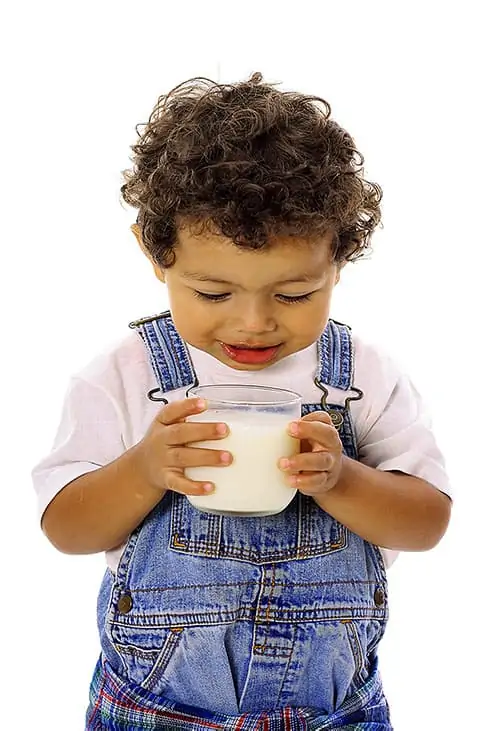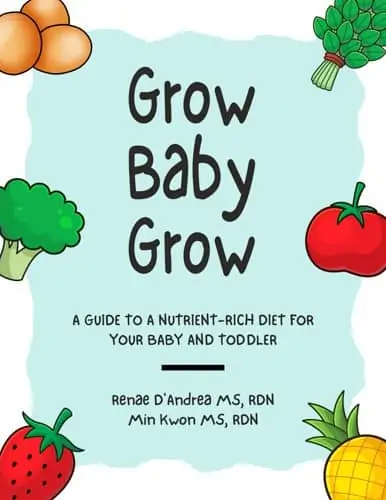Milk is one of the most confusing topics out there for parents. There are so many questions about it! One of the more common questions I get is exactly how much milk should a 1 year old drink. Or even a 2 or 3 year old! It’s usually not as much as you think!

Keep Milk to 16 oz A Day or Less
When it comes down to it, you want to keep milk to 16 oz a day or less for kids 1 and older. But just what do we mean when we say milk?
Milk Isn’t Just Cow’s Milk!
When we say milk, nowadays we really don’t just mean cow’s milk.
Sure, it wasn’t that long ago that cow’s milk was the only milk option available, but now there are a ton of different milk options, both animal and plant-based. So when we talk about keeping milk to 16 oz or less, we’re talking about cow’s milk or whatever milk alternative you drink.
More: For help with what milk to choose for your toddler, head to this article on the best milk for a 1 year old.
What About Breast Milk?
What happens if after 1 you are still breast feeding? How does this guidance pertain to you?
First and foremost, if you are nursing at least 3-4 times a day, then there is no need to serve any kind of milk at all. For lots of help and details on breastfeeding after 1, check out this article.
With nursing, it’s almost impossible to know exactly how much milk your toddler is getting. So you can pretty much overlook this advice.
If you are pumping or serving breast milk in a bottle or cup, then you can still follow this guideline. But know that there is a lot more wiggle room with breast milk due to it’s make up than with other kinds of milk, so it’s okay to go over!
The Main Concern With Too Much Milk
There are a handful of different concerns with your toddler getting too much milk. They include things like an impact on iron absorption and crowding out of other important nutrients in their diet. The one that concerns me most, though, is when milk becomes a primary component of their diet.
Once you wean from breast milk or formula, which ideally happens no earlier than 1 year, we want food to start to take on a bigger importance in your child’s diet.
So often, I see kids that don’t really like a lot of foods and textures, but love milk. And all they drink is milk. With a little bit of food added in.
While this does get calories in them, it doesn’t get a lot of other really important nutrients in.
It can also be easy as parents to fall back on milk to fill in a child’s diet. In reality, we really want to be helping them to work through any concerns there are with eating so that they can learn to like more foods.
Because we know that learning to eat different foods is a skill that takes practice. And when you can get full on milk, there’s really no reason to put in that practice and learn the skills you need to. And then a vicious cycle starts.
Need help with mealtimes?
Get help with stress-free meal times, broadening your child's food horizons, helping them develop a positive relationship with food, and so much more!
How Often Should You Serve Milk
I generally recommend serving it in just 2-3 servings a day. My goal would be for there not to be milk at every eating opportunity. But with that said, your family and child are unique. It’s okay to alter how often you serve milk to fit your family. Just aim to keep it below that 16 oz mark.
Keep in mind the goal of not having milk to drink at every meal and snack so that there is more reason to actually eat the food. It also helps from a nutrient absorption standpoint.
My Toddler Doesn’t Want to Drink Milk

Sometimes, the problem isn’t how much milk your 2 year old should drink, but how much they aren’t drinking. If you are in this boat, take comfort in the fact that you are not alone. Many kids never take to milk.
Know that milk, and remember we’re not specifically talking cow’s milk here but milk of any kind, plays a fairly important role in a toddler’s diet. I like to think of the time when they’re 1 and 2 as a transition period.
Before they were 1, milk was the most important part of their diet.
After they turn 2 or 3, food is really the main part of their diet.
But in those in between years, they usually need a transition period. A time where they start adjusting their diet to be more food heavy. But it can take a little bit of time. And milk does provide that buffer to get them to the food first stage of their diet.
Should I Be Concerned If My Toddler Isn’t Drinking Milk?
Because we look at milk as a stop gap as their diet is transitioning, whether you should be concerned or not is going to depend on your child and their dietary habits.
Do they eat a pretty well rounded diet with lots of fat and calcium sources? Or are they firmly in the carb heavy part of toddlerhood where they prefer to stick with just breads and other similar food?
If they aren’t eating a well rounded diet, than milk might play a more prominent role in helping them to meet their needs. It might be worth experimenting with what type of milk you are serving, and when you’re serving it.
If their diet is well rounded, than you more than likely don’t need to be concerned. Make sure you’re focusing on fat and calcium in their diet, and ensuring they are offered adequate water to stay hydrated.
The Bottom Line
At the end of the day, milk is a tool in your toolbox to help your child meet their dietary needs. Like everything else, too much of a good thing can be...too much! Aim to avoid serving more than 16 oz of milk every day.

Get the Grow Baby Grow Ebook!
The ebook designed to help you feed your child a nutrient-rich, varied diet! You'll learn all the nutrients that are important in the first two years of your child's life, what the best foods are to get those nutrients in, and how you can serve a varied diet to ensure you are meeting all of their needs!

